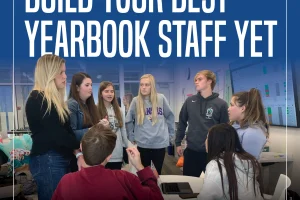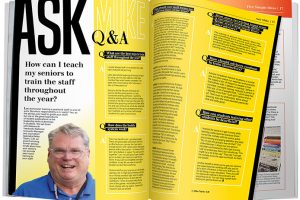
Start Off Strong with These Systems of Success
School gets back in session sometime between August 1 and Labor Day. As we get back to our classrooms and our staffs are back in school full time, consider putting these systems in place to get you and your staff off to the strongest possible start for the 2022 year.
1. System of Communication
In my 40 years of advising and working with advisers, the way you communicate as an editorial team and as a staff will play the most important role in making your year smooth, fun and rewarding. Make time to meet with your leadership team before school starts and regularly throughout the year.
- As summer comes to an end, meet with your leadership team. Before school starts, set up a time to meet with your editorial leadership team to plan for the start of school. You will need to develop a training plan to ensure your staff is ready to start covering the year before it starts. If a majority of your staff remains too long untrained, you may miss many of the crucial events that happen as the summer ends and the school begins.
- Review what you learned at your summer workshop. Gather your camp team and review what you learned and discuss the progress you made on your theme and design elements. Discuss ways you can bring what you learned to the staff who did not attend.
- Set up your online communication system. From the very beginning of the year develop your system to keep everyone informed about what is going on. Use this system to monitor progress on pages, debrief completed deadlines, and communicate needs and issues as they arise. If you want to use an online organization and communication tool, decide what project management system software is best for you. Several years ago, a number of publications staffs began using Trello as a means to communicate and manage the production of the book. More recently staffs have been migrating to Slack as their management and communication software. However, because the options for using Slack have certain limits before it is no longer free, some are moving toward a program called Basecamp. Take a look at the options and determine what features work best for you. My only caveat is that you must be sure that these kinds of tools will save time and improve communication and not just create another level of work.
- Check out this article from Courtney Hanks, the adviser at University High School in Orange City, Florida, about how she and her staff have moved to Basecamp to manage their production.
- Here is another resource from Michael Simons about how he and his staff use Slack to organize their production.
2. System of Staff Organization and Staff Roles
Define and solidify your job descriptions and staff roles. If these are not already spelled out, make time to clearly redefine together what each person on staff will be expected to do. Staff and editor job descriptions should be revised every year and be a major part of your staff manual. How can students excel if they don’t know what is expected of them?
3. Training System
- Begin training your staff as soon as is possible – even before school starts. Job one at the beginning of the year is to get the staff trained as best as you can in the time available before production goes into full swing. We would spend a major part of our class time in training during the first four to six weeks.
- Hold your own staff boot camp. Consider holding a staff boot camp the week before school starts. Start the training process as early as possible so the staff can start shooting photos, interviewing and covering events well right from the start. In one day at boot camp you can cover material and train your staff in time that would take a week or two of class periods before after the year starts. Recently I have also been reading about several staffs who hold their boot camp on a weekend AFTER school starts.
- Attend Walsworth’s Start-of-School Boot Camp. For the second year we will be offering a two day boot camp on August 25-26 to get you off to a great start. Mike Taylor, Jim Jordan and Legacy High School’s Leland Mallett will be your hosts.
- Photo training is the most essential. Be sure your photo staff is ready to take photos BEFORE the year even begins. Have your experienced staff train your rookie photographers and get them out practicing their craft at end-of-summer practices and events.
- Develop your full staff training sequence. If you can’t hold any summer trainings, thoughtfully set up a timeline for how you will train your staff to do what is required of them. Start with interviewing and caption writing. Most issues with the staff arise when you have not trained your staff well and you expect them to do things they are not prepared to do at the level they will be required to.
- Create your lesson plans for the first two weeks of school. Your staff and the process of creating the book should be led by your editors. Every day the editors should be in charge of running the class and being sure all necessary work is getting accomplished. With your guidance plan what needs to be accomplished every day in class. In my 35 years of advising one of our weaknesses was not using every minute of class time as wisely as we could have or should have. When you waste class time, it only means there will be more to do after school or on work nights or weekends.
4. System of Social Media
- Develop your strategy. Review how you plan to use social media throughout the year. Every staff needs a strong social media team to push out information to your school community about the book and its production. As we saw last year, it can also be a great way to directly contact students and gather information and photos that can be used in the book. More than anything else use social media to create buzz and keep everyone excited that a great yearbook is being made that will capture their year.
- Recruit your team. If you don’t already have your team in place, identify who will be in charge of pushing about information and keeping your sites up to date.
- Utilize Walsworth’s monthly social media calendars. Walsworth will continue to provide monthly calendars that have great suggestions about daily use of your social media channels. These are a great resource to consistently promote your yearbook while engaging with your school community as well. Each post is designed with a call-to-action to purchase the yearbook and with a variety of categories, the messaging will stay fresh throughout the month.
5. System of Fun
- Initiate the fun – even before school starts. Never forget that above all else, this nine month process of creating a yearbook that tells the story of a year at your school should be a FUN journey. It’s way too easy to forget this and let all the work and stress get the better of everyone. Take time. Make time to keep the process fun. This is more important than ever in this post-pandemic year.
- Begin the staff bonding. Before school even starts, begin building your team. A close-knit staff makes the work ahead much more fun. Have a party during the last week of summer to welcome new staff members and show them that they are now a part of a supportive, fun team and that an amazing journey lies ahead.



